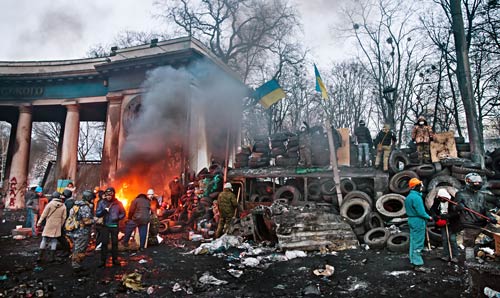Translation and conflict
CTIS research in this area examines the role played by translators and interpreters in mediating conflict.
Our research

In all types of conflict, translation is central to the ability of all parties to legitimize their version of events; this is especially true of contemporary political conflicts, which are played out in the international arena and can no longer be resolved by appealing to local constituencies alone.
This research draws mostly (but not exclusively) on narrative theory to examine:
- the ways in which the discursive negotiation of conflictual and competing narratives is realized in and through acts of translation and interpreting, from the selection of texts to be translated, to
- the way the texts (or interpreting events) are framed visually and paratextually, to
- specific choices at the level of text or utterance.
It involves examining the use of translation by powerful, well-funded institutions, including the media, as well as its use by various groups of peace activists and humanitarian organisations with little or no funding and no access to major media outlets.
PhD projects
- Waleed Al-Amri (2002) Semiotics, Translation and the Press
- Mahmoud Al-Herthani (2009) Edward Said in Arabic: Narrativity and Paratextual Framing
- Dimitris Asimakoulas (2005) Brecht in Dark Times: Translations of Brecht's Works in the Censorship Context of the Greek Junta (1967-1974)
- Julie Boéri (2009) Babels, the Social Forum and the Conference Interpreting Community: Overlapping and Competing Narratives on Activism and Interpreting in the Era of Globalisation
- Sue-Ann Harding (2009) News as Narrative: Reporting and Translating the 2004 Beslan Hostage Crisis
- Souhad Hijazi (Al Sharif) (2009) Translation in the Service of Advocacy in the Context of the Middle East Conflict: Images of Palestinian Women
- Amani El Khatib: The Positioning of Web-based Media Outlets in the Coverage of the Palestinian-Israeli Conflict: A Bourdieusean Analysis
- Rebecca Johnson: The Clash of Articulations: A Narrative Account of Creative Subversion, Intersectional Identity and Islam in Post-9/11 Britain and France
- Dinithi Karunanayake: Theatre Translation, Communities of Practice and the Sri Lankan Conflicts: (Re)narration as Political Critique
- Kalliopi Pasmatzi: Theorising Translation as Cultural Repatriation: The Greek Civil War Narrative Translated into Greek
- Neil Sadler: Analysing Fragmented Narratives: Twitter Reporting of the 3 July 2013 Events in Egypt
- Caroline Summers (2013) Narratives of Dissidence and Complicity: Translating Christa Wolf Before and After the Fall of the Wall
Selected publications
- Boéri, Julie and Carol Maier (eds) (2010) Translation/Interpreting and Social Activism, Granada: ECOS.
- Boéri, Julie (2008) 'A Narrative Account of the Babels vs. Naumann Controversy: Competing Perspectives on Activism in Conference Interpreting', The Translator 14(1): 21-50.
- Brownlie, Siobhan (2007) 'Situating Discourse on Translation and Conflict', Social Semiotics 17(2): 135-150.
- Pérez-González, Luis (2010) ''Ad-hocracies' of Translation Activism in the Blogosphere: A Genealogical Case Study', in Mona Baker, Maeve Olohan and María Calzada (eds) Text and Context: Essays on Translation and Interpreting in Honour of Ian Mason, Manchester: St. Jerome, 259-287.
